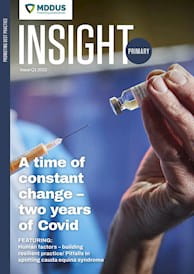
I AM a student again. Or, more accurately, a trainee. Since last year, I’ve been training in a new profession. There has been much to navigate, all of which has ethical dimensions and has prompted reflection on medical and healthcare education and training.
The change in identity as a trainee is marked. Like everyone, I bring my experience, background and education, but I’m also a beginner. A training environment that recognises and values what people bring but acknowledges what it is ‘not to know’ is difficult. When education and training take place in the context of patient care within stretched systems it is even more difficult. Healthcare education sits in that territory.
No one, whatever stage at which they decide to train, is ‘an empty vessel’. People bring their own experiences of illness, vulnerability, healthcare systems, care and values. Yet those can be quickly forgotten as students grapple with the often-overwhelming demands of learning large amounts of information and the development of new skills. Students are daunted as they realise the stakes in clinical practice.
Trainees must form, develop and reform relationships with a changing cast of people who evaluate their performance and ultimately have the power to determine whether they progress in the profession. Alongside these complex negotiations, students and trainees have lives to manage beyond the professional, with family responsibilities, financial pressures and a diminished social life.
It is an ethical act to reflect on both context and how we as individuals meet and treat our students and trainees. We tend not to conceive of the context within which learning and training takes place as an ethical question, yet it is. We focus on learning outcomes, sign-off expectations, and assessments. We attend less to the moral assumptions about people’s value and whether we acknowledge its importance in learning and training. At a basic level, needs are overlooked. Finding time to go to the loo or stay hydrated, having access to food and places to leave a bike securely or park a car at night remain astonishingly difficult for many healthcare students and trainees.
These inadequacies, of course, affect those who have reached the end of training, but the effect is potentially more damaging for the trainee who is not in an equal relationship to colleagues, and who is often combining clinical with weighty academic responsibilities. This is not merely a matter of practicalities: it speaks to what we value and how we care for our colleagues and trainees.
Individuals can and do offer much in terms of the choices that they make about their trainees and students. Many supervisors and tutors nurture and value what trainees and students offer, modelling and fostering respect and inclusion. Others do not.
This may sound to some ‘soft’ or, that most damning of descriptions ‘touchy-feely’. It is neither. It is an acknowledgement of dignity and expression of respect. It is also difficult. It means having brave and honest conversations when a trainee is in difficulty. It means reflecting on one’s own role in an unforgiving system. It means trying to make a difference when morale is low and exhaustion is high. It means imagining, empathising and putting the interests of someone else ahead of what is easy, convenient or simply the norm. It means questioning and being curious rather than accepting the next rotation of students as a generic rolling task. It means remembering one’s own, perhaps painful experiences of training and the legacy of the same, whilst not imposing that template on others. It means being open to different types of knowledge and experience as well as being generous with your own expertise.
The other element of recognising the ethical dimensions of training and learning is emotion. Often becoming a trainee or student within an institution will prompt anxiety, insecurity, ambivalence or even resentment. Adults become subject to exacting rules, regulations and evaluation. Alongside the explicit expectations are the implicit norms and an unfamiliar culture in which people strive to be ‘good’ or at least ‘good enough’.
An ethical approach to education and training attends to these emotions and reflects on whether it is facilitating or impeding development. Regression and dependence are common amongst students and trainees, but we perhaps think too little about why that might be even as we assess, warn about unprofessionalism and send flurries of emails about deadlines and forms to complete. I have written before about judgement and its ethical importance; do we have an educational and training approach that fosters and supports its development?
In professions such as healthcare, training is long and most people will, at some stage, work with students and trainees. That work is effortful, challenging and may not even seem to be appreciated, yet it is also potentially transformative. It is no easy matter, but it is inherently an ethical endeavour.
Deborah Bowman, Emeritus Professor of Bioethics, Clinical Ethics and Medical Law at St George’s, University of London
This page was correct at the time of publication. Any guidance is intended as general guidance for members only. If you are a member and need specific advice relating to your own circumstances, please contact one of our advisers.
Read more from this issue of Insight Primary

Save this article
Save this article to a list of favourite articles which members can access in their account.
Save to library